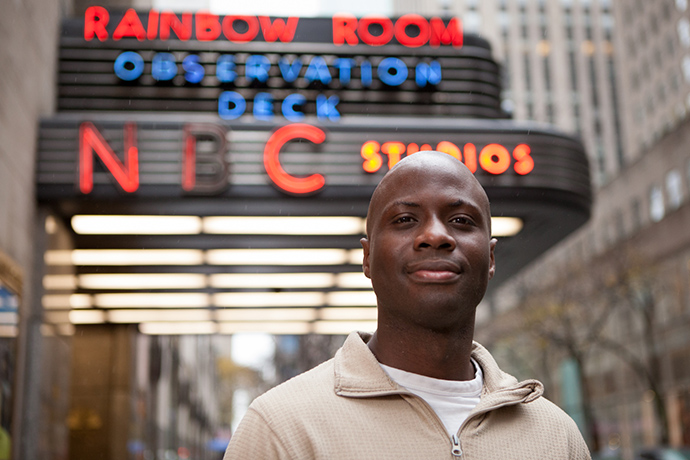Keeping Saturday Night Safe
Nov. 13, 2020

Hashmiru Sesay, a second-year producing student at the Feirstein Graduate School of Cinema, is COVID health and safety manager at "Saturday Night Live."
When New York State first went into quarantine last March, Hashmiru Sesay, then a first-year producing student at the Feirstein Graduate School of Cinema, lost his job at a production company, and most of the other film projects he was working on fell through.
“Between no work and remote school, I was sitting at home not feeling good at all,” he says.
But as the city opened up over the summer and productions resumed, the former nurse—who had left the field about a year earlier to put an all-out effort into his dream of becoming a filmmaker—found work on a Facebook commercial as a set medic. He was mostly helping a friend and earning a little pocket change, he says, but it led to a chance meeting with another medic who realized his combination of production experience and medical training made him perfect for a position she was looking to fill.
“She said, ‘Would you mind if I sent your résumé to the president of health and safety at NBC Universal?’” Sesay recalls.
A week later, he’s talking to the network executive, and a week after that he became the COVID health and safety manager, charged with overseeing social-distancing and other pandemic protocols for the cast and crew of all pre-recorded skits for the 46th season of "Saturday Night Live."
“It was quite surreal when I was offered the position,” says Sesay, who was especially nervous because he was the first to hold the job for the comedy show. “Frankly, it’s a dream. I finally feel like I’ve been given a shot, so I am laser-focused on maximizing this opportunity.”
Now six shows in, Sesay is getting into his stride. He interfaces with all areas of production, analyzing set builds, managing maximum occupancy, reporting unsafe events, recommending remedial and preventative actions, and developing safety plans for a cast and crew that is upwards of 75 people on any given week. It’s a full-time position that begins anew each Tuesday when they first get the script, through Saturday morning when most of the pre-produced material is wrapped up. Fridays, when the bulk of the shoots are done, are his favorite.
“There are so many logistics and nuances you have to take into account to make sure everyone is being as safe as possible,” says Sesay, who had picked up an eight-week stint working on the COVID floor of Manhattan’s Memorial Sloan Kettering Cancer Center last spring; he had the skill set and the city had the need. “Enforcing the policies has been the hardest part. It’s not in my nature to correct people constantly. I think the universe put this position in my lap so that I could gain certain skills.”
He’s also meeting people in the industry and building relationships. The fanboy in him keeps it professional, but he says the entire cast is “so down to earth.” Chris Rock was “pretty cool,” but Dave Chappelle was inaccessible—he didn’t have any pre-recorded skits, so Sesay never got to meet him.
“It’s been a great learning experience. It is my first time working on a TV show and seeing how hard everyone works and the intense pace of everything,” he says. “I’m just excited to move forward with the season. We can be a shining example of how a huge production can go on.”






